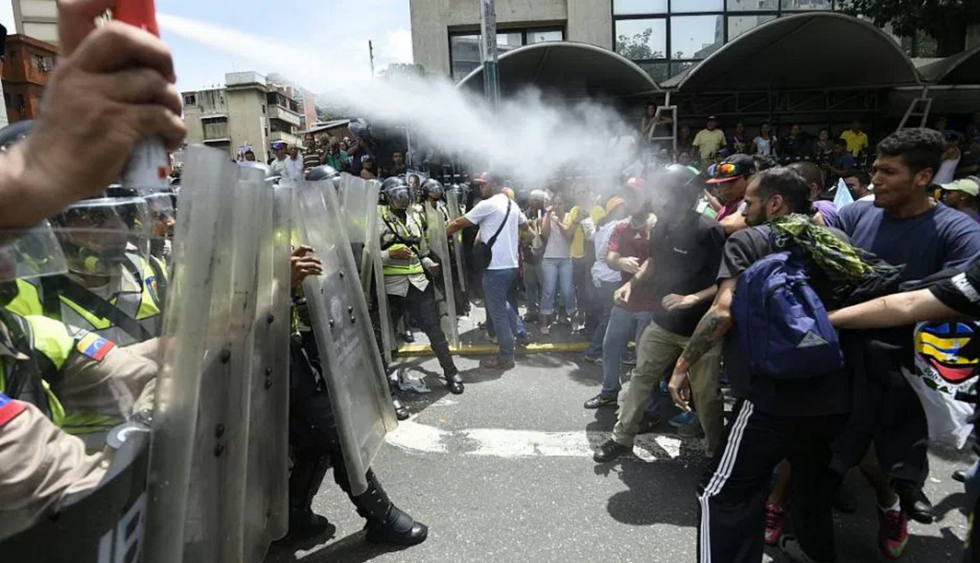This past Wednesday, May 18th, several thousand members of Venezuela's opposition protested in the streets of Caracas and other states of the country to demand that a referendum for a presidential recall be done as soon as possible, as the constitution allows for.
About 23 days ago, the collection of the signatures needed to legally request the presidential referendum, about 196,000 or one percent of the whole Venezuelan population, began.
People all over the country gathered in the streets to repudiate a corrupt and impoverishing government.
Not only civilians took part of this event, but members of the national armed forces and public workers were also protagonists of the day.
In only 48 hours, two million signatures were collected for the approval of the national election board.
In an interview with CNN en Español’s Patricia Janiot, Julio Borges, congressman and leader of the opposition in the Venezuelan National Assembly, stated what Venezuela is screaming from the streets:
“It’s unanimous. Every Venezuelan wants the referendum as it is a mechanism for peace in Venezuela. That’s exactly what we’re demanding: peace, the ability to vote and the honoring of the constitution.”
He continued to defend the people by saying that they are not taking the streets asking for a coup d’état or seeking for violence.
"The people are simply protesting for a referendum to be effectuated as the country is fed up of everything that’s happening", claimed Borges.
The congressman blamed the Venezuelan government of not believing in votes, in dialogue between the political parties, in democracy, in the constitution, in the opposition lead National Assembly, which was elected about 100 days ago and of not believing in the Venezuelan people who voted for that Assembly.
Borges seemed to hit the nail in the head regarding the feeling of most Venezuelans and it was proved in the streets where the people were defending the right of electing the governing body of their nation.
Pacific Protest Turns Violent in Caracas
During a press conference the evening after the protests, Henry Ramos Allup, president of the National Assembly, accompanied by one of the leaders of the opposition Henrique Capriles, exposed the reality lived in the protest.
Ramos Allup stated that even before arriving at “Plaza Venezuela”, where all protestors were to meet before heading for the National Electoral Council Headquarters, CNE, the National Guard and Police were cordoning the people off and keeping them from reaching the CNE Headquarters.
To avoid conflict, opposition leaders moved the march to one of the adjacent streets: Libertador Avenue.
As the march recommenced, the alternative proved to be no better than the original plan.
Protesters were met by the Armed Forces, who tear gassed and pepper sprayed the masses, in addition to barricade the highway, obstructing their path.
Similarly, Henrique Capriles asserted that the march was infiltrated by members of pro-government groups and snipers.
The Big Difference
Despite the myriad obstacles that the opposition has had during the process of verification of the signatures, they are working hard to make the referendum happen this year.
If the referendum is done this year, then President Nicolás Maduro, along with the rest of its government would be obliged to resign.
On the contrary, if the referendum is delayed by a year and moved to 2017, President Maduro alone would give up the position, leaving the rest of his people in charge of the country until the presidential term is over.
According to the Venezuelan Constitution, the period for the verification of the signatures should be five days. However, the CNE has been in this process for over 20 days in the hopes of further delaying the referendum.





 Energetic dance performance under the spotlight.
Energetic dance performance under the spotlight. Taylor Swift in a purple coat, captivating the crowd on stage.
Taylor Swift in a purple coat, captivating the crowd on stage. Taylor Swift shines on stage in a sparkling outfit and boots.
Taylor Swift shines on stage in a sparkling outfit and boots. Taylor Swift and Phoebe Bridgers sharing a joyful duet on stage.
Taylor Swift and Phoebe Bridgers sharing a joyful duet on stage.












